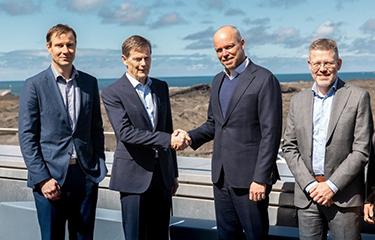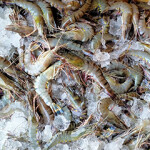Samherji, HS Orka to build 40,000-MT land-based salmon farm

Icelandic fish farming company Samherji Fiskeldi, part of the Samherji Group, has entered into an agreement with power provider HS Orka for the development of a land-based salmon farm in Iceland’s Resource Park, with the partners saying the goal is to “produce a wholesome quality product with a low ecological footprint.”
Access to the sea and the electricity required to produce up to 40,000 metric tons (MT) of salmon on land annually have already been secured, according to a Samherji press release. Production will utilize warm sea-water resulting from the cooling processes at the Reykjanes Power Plant. Samherji has also reached an agreement with landowners for the development.
The farm is planned to be developed in three phases over the next 11 years, and will consist of a hatchery, an on-growing farm, a processing house, and service buildings – with the total investment estimated at more than ISK 45 billion (USD 371.7 million, EUR 306.5 million).
Samherji’s board will provide funding for the first phase of the project but plans to seek funding from investors for the further expansion of the facilities.
Work on the assessment process, licensing, and design has begun and is scheduled to be completed next year. According to Samherji's plans, juvenile production will start in the first phase in early 2023, and continued farming and processing of products in 2024 and 2025.
The farm's first phase will include capacity for 10,000 MT of salmon production, at an estimated investment cost of ISK 17 billion (USD 140.4 million, EUR 115.8 million). In the second phase, another 10,000 MT of capacity will be added. The third phase of the farm's construction will add another 20,000 MT of capacity.
If everything goes according to plan, the land-based farming in the Resource Park will be at full capacity in 2032, Samherji said.
Samherji Fiskeldi currently operates a processing plant in Sandgerdi, a farm in Stadur by Grindavík, and a farm in Vatnsleysuströnd. The company also has a salmon farm in Núpsmýri and a hatchery in Núpar.
HS Orka currently operates two geothermal power plants in Svartsengi and Reykjanes and one hydropower plant at Brú in Tungufljót in Biskupstungur. In the resource park around HS Orka's geothermal power plants, a unique community of companies has been built that utilize resource streams from the power plants in their operations.
The new farm will support the resource park's strategy of utilizing excess resource streams from geothermal power plants, which today flow partly unused to the sea.
"The resource park's ideology is precisely to promote better resource utilization,” HS Orka CEO Tómas Már Sigurdsson said. “In this project, seawater from the Reykjanes Power Plant will be used to ensure a constant ideal temperature for fish farming.”
Samherji Fiskeldi Managing Director Jón Kjartan Jónsson said that finalizing the agreement for the new farm is a “big step” for the company.
“We have achieved good results in aquaculture on land, and this investment reflects the confidence we have in the continued growth of this industry. We are excited to build in this area and to enjoy the benefits of close proximity to HS Orka and the Reykjanes Power Plant,” Jónsson said. “In this area, there are some of the best conditions for aquaculture we have seen.”
Samherji CEO Thorsteinn Már Baldvinsson said the investment will create dozens of jobs in Reykjanesbær and the Southern Peninsula region and significantly increase Iceland's export revenues.
“The board of directors of Samherji has already agreed to contribute ISK 7.5 billion [USD 66.1 million, EUR 54.5 million] to this aquaculture project to ensure the development of the first phase,” Baldvinsson said. “In my opinion, it shows the confidence we have that this is the right path to the future of food production and value-creation. At a later stage, we will look for more investors to ensure the complete structure of the project.”
Photo courtesy of Samherji






Share